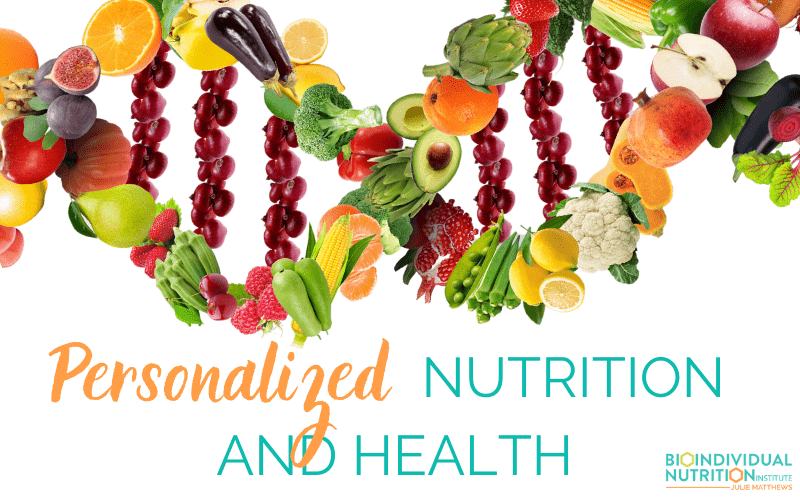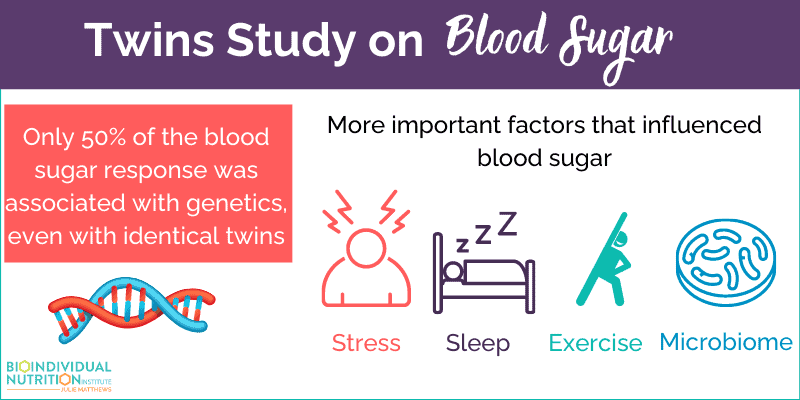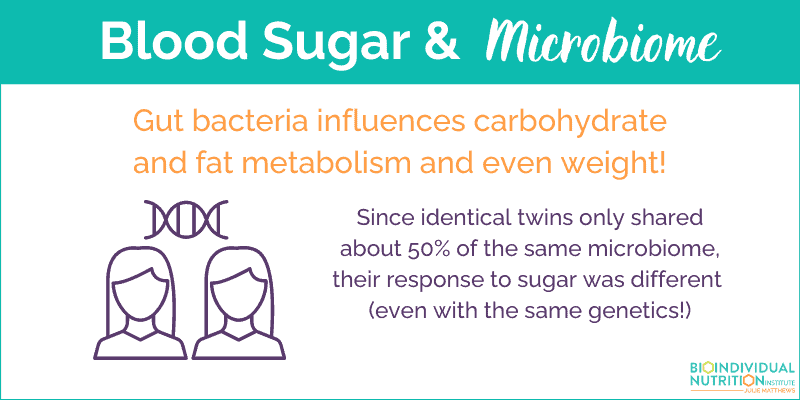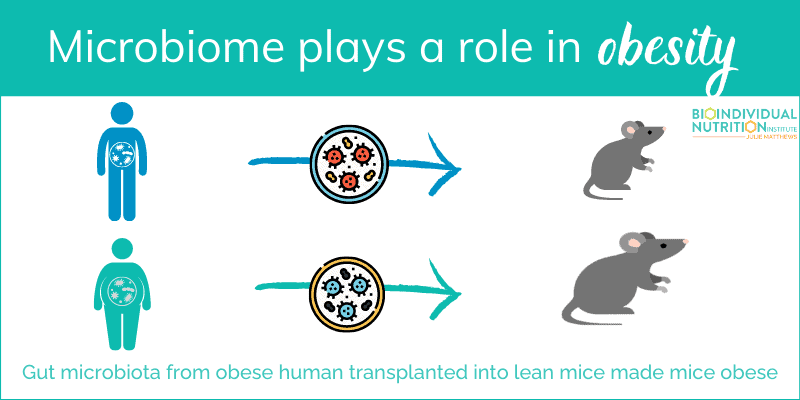
How Our Genes vs. Microbiome Affect Blood Sugar and Foods We Tolerate
The primary goal of personalized nutrition is to create a diet that best meets the needs of an individual. Each person has a different response to specific types of food, as a great diet for one person may not be nearly as effective for another. Instead, it’s much more helpful to follow a personalized diet and nutrition plan for the best results.
Personalized nutrition takes into consideration a person’s age, symptoms, health conditions, genetics, and lifestyle.
A personalized nutrition plan also considers the microbiome, which consists of trillions of bacteria in the human body. However, the type of bacteria is unique for each person and can change over time, in relation to illness, or in response to dietary shifts. And, your microbiome also impacts the foods and specific diet that may be right for you. In fact the ability to match one’s diet to their microbiome may play a role in reducing the development of chronic disease and metabolic syndrome.
Following a personalized diet and nutrition strategy can play a crucial role in helping you stay healthy. In fact, personalized nutrition is the future of healthcare.
Personalized Diet and Blood Sugar Levels
We have known for decades that our diet affects our blood sugar levels and over time affects our blood sugar regulation. Additional bioindividual factors also play a role in our blood sugar levels. Therefore, a general set of diet recommendations is not effective. Following a one-size-fits-all approach for managing high blood sugar levels is nearly impossible due to the wide variability in blood sugar spikes between people.
However, one way to overcome this problem in controlling high blood sugar levels is for individuals to utilize personalized nutrition counseling. When one looks at unique differences and responses to various macronutrients and foods, then you can truly personalize a diet that supports optimal wellness.
In fact, the PREDICT 1 Study found that even in identical twins, only 50% of the blood sugar response was associated with genetics, and less than 30% could be attributed to their insulin and triglyceride response. [1] The more important factors were environmental, such as stress, sleep, exercise, and the gut microbiome.

Even twins only shared about 50% of the same microbiome. Those differences in the makeup of the gut bacteria influenced things like carbohydrate and fat metabolism and even weight! And, blood sugar regulation varied as the body processed foods differently as a result of the microbiome differences.

This brings the exciting potential to life that we are much more than just our genetic makeup and that we have greater control over things like weight, metabolism, blood sugar regulation, even gene expression through personalized nutrition than previously thought. In fact, the study also found that looking at individual responses to foods can give vital information needed to adjust diet in such a way that reduces large fluctuations in blood sugar. Knowing what the individual’s triggers are can mean differences in health outcomes in the future.
Let’s explore the gut microbiome and personalized nutrition, and next the interplay between our genes and foods/diet such as coffee and sugar, and how studying metabolites from foods can predict disease risk.
Diet Plans Based on Individual Gut Microbiome
Our microbiome is unique and influences the foods we tolerate, as well as the health conditions we may develop.
In a 2013 study researchers transplanted gut microbiota from an obese human twin into a group of lean mice. [2] These researchers also performed the same task with a lean human twin. Both of the mice groups consumed the same diet, but the first group that received the transplant from the obese human twin became obese while the other group remained lean. This study shows that the gut microbiome can play a role in determining obesity.

Studies have already begun with humans to see if fecal microbiota transplants can help treat obesity. There are also fecal microbiota transplants in people with autism that have been done which have shown significant improvement , along with a two year follow up study showing the improvements had lasting results. [3] [4]
Additional studies are also looking at how the gut microbiome can impact cardiovascular disease and diabetes.
The individual gut microbiome can affect our need for personalized nutrition, personalized probiotics, and even personalized healthcare.
Personalized nutrition is being studied extensively, as researchers understand the role our individual genes and microbiome have on the food we tolerate. This was stated well in a recent paper, “Our inherited genome and our microbial ‘second genome’ both intricately modulate our response to diet; this has been studied and established.” [5]
Genes and Foods/Diet Interaction
Our genes influence the foods we tolerate, the foods that support our health, and those that are harmful, and it’s a two way street. The foods we eat can influence our genes through epigenetic expression (the way genes/enzymes get ramped up or dampened down).
Your Genes and Coffee
One example of this gene/food interaction is coffee. While it’s not right for everyone, coffee can be beneficial for some people.
Genetic analyses shed additional light on how coffee impacts the body. Harvard researcher, Marilyn Cornelis discovered eight genetic variants related to coffee consumption: [6]
- 2 genes are related to metabolism of caffeine
- 2 genes are associated with the psychoactive effects of coffee
- 2 genes are related to lipid and glucose metabolism (though how they affect coffee metabolism is unknown)
Some individuals are fast metabolizers while others are slow and our genes determine how much coffee you can tolerate and whether your body responds positively or negatively to it.
Performing additional genetic analysis on how different people metabolize coffee can help identify which individuals might benefit the most from increasing their coffee consumption and those that would benefit from reducing it.
Relationship Between Genetics and Sugar
As we discussed earlier, each of us metabolizes and tolerates sugar differently. And there are many factors that affect how we metabolize sugar, one of these is our genes.
A 2012 study showed that people were more susceptible to increased body mass index by drinking sugar-sweetened beverages if they carried more obesity gene alleles. [7]
The study also found the genetic effects were twice as great in those with greater consumption (people that consumed one or more sugar-sweetened beverages per day) than those who drank less than one per month. The study results suggest that consumption of high sugar beverages may intensify the genetic risk of obesity.
Genes have the ability to affect the foods we tolerate and foods also have the ability to influence our gene expression – both healthy foods and unhealthy foods. When we eat healthy foods the opposite happens, and our genetic risk of disease often decreases.
Therefore, while genes influence the hand we are dealt, it doesn’t mean we are destined to a certain outcome. The good news is that the foods, diet and lifestyle choices our clients make can be the difference between health and disease.
Genes and Lifestyle
Regarding lifestyle, the earlier 2012 study also showed that increasing physical activity can potentially decrease the genetic risk of obesity. Ultimately, individuals following a healthy diet and lifestyle can overcome their predisposition of obesity genetics.
Unique Metabolites in Food and the Study of Personalized Nutrition
Scientists use complex analytical techniques to learn more information about metabolites, which are small molecules that are the product of metabolic reactions within cells. All of the metabolites in our body are known collectively as our metabolome, and the study of this area is called “metabolomics.”
Specific foods and diets have their own unique metabolic signatures. And researchers are now analyzing the relationship between these metabolic signatures, diet, and diseases.
Nutritional metabolomics is helping nutrition research rapidly move from population-based to individual-based study. [8] With the ability to now study hundreds of metabolites we can measure health changes related to diet as well as the nutritional biomarkers of nutritional interventions. Nutritional metabolomics is shaping the future study and the effective practice of personalized nutrition.
Challenges and Strategies of a Personalized Nutrition Plan
 When we hear of “personalized” or “precision” nutrition these days, we are often presented with genetic testing and claims that this will tell us exactly what our clients should eat.
When we hear of “personalized” or “precision” nutrition these days, we are often presented with genetic testing and claims that this will tell us exactly what our clients should eat.
The field of personalized nutrition faces various challenges when it is based on solely genetic testing, such as the cost of technology in collecting and studying DNA, the limitations of our understanding of the genome and its complexity, artificial intelligence limitations and its understanding of food reactions, and the confounding factors of the gut microbiome and its own genome. Ethical and legal issues also pose challenges in implementing precision nutrition, such as protecting a patient’s privacy while testing and using this technology. These personalized approaches may only be accessible to a small number of people, increasing health disparities. And finally, primary care physicians and other healthcare and nutrition providers need to be educated on best applying personalized nutrition for patients.
Genetics is only one of 7 different areas we consider at the BioIndividual Nutrition Institute (symptoms, diet analysis, reactions to foods, food cravings, functional labs, genetics testing, and other client considerations). Personalized nutrition is not just the DNA data. Genetic data requires good AI to be able to interpret and this technology is still emerging, and can never explain the full picture.
Following an Individual Diet Plan
Personalized nutrition holds the key to opening the door for increased health and wellness using the right food for the unique individual. This is an exciting, yet growing field. More healthcare practitioners and nutritionists need to understand the role of personalized nutrition for not just health challenges but also for optimizing health and longevity.
And this is where taking your clients’ unique needs into account and personalizing nutrition recommendations to the bioindividual needs of the individual is the key. What I’ve learned after working with thousands of clients and practitioners I’ve trained is that for a diet to be most successful, it needs to be tailored to the individual needs of each person. Personalized nutrition, or BioIndividual NutritionTM as I call it, is about taking the specific diet principles your client requires and creating the personalized therapeutic diet plan that’s right for them.
My professional Bioindividual Nutrition Training provides a methodology for determining the best therapeutic diet and personalized nutrition recommendations for your clients, along with all the tools, food lists, and meal plans you need.
References
- Berry, Sarah E., Ana M. Valdes, David A. Drew, Francesco Asnicar, Mohsen Mazidi, Jonathan Wolf, Joan Capdevila et al. “Human postprandial responses to food and potential for precision nutrition.” Nature medicine 26, no. 6 (2020): 964-973.
- Ridaura, Vanessa K., Jeremiah J. Faith, Federico E. Rey, Jiye Cheng, Alexis E. Duncan, Andrew L. Kau, Nicholas W. Griffin et al. “Gut microbiota from twins discordant for obesity modulate metabolism in mice.” Science 341, no. 6150 (2013).
- Kang, Dae-Wook, James B. Adams, Ann C. Gregory, Thomas Borody, Lauren Chittick, Alessio Fasano, Alexander Khoruts et al. “Microbiota transfer therapy alters gut ecosystem and improves gastrointestinal and autism symptoms: an open-label study.” Microbiome 5, no. 1 (2017): 1-16.
- Kang, Dae-Wook, James B. Adams, Devon M. Coleman, Elena L. Pollard, Juan Maldonado, Sharon McDonough-Means, J. Gregory Caporaso, and Rosa Krajmalnik-Brown. “Long-term benefit of Microbiota Transfer Therapy on autism symptoms and gut microbiota.” Scientific reports 9, no. 1 (2019): 1-9.
- Bashiardes, Stavros, Anastasia Godneva, Eran Elinav, and Eran Segal. “Towards utilization of the human genome and microbiome for personalized nutrition.” Current opinion in biotechnology 51 (2018): 57-63.
- Powell, Alvin. “Java in the genes” The Harvard Gazette, October 7, 2014. Accessed October 25, 2021. https://news.harvard.edu/gazette/story/2014/10/java-in-the-genes/
- Qi, Qibin, Audrey Y. Chu, Jae H. Kang, Majken K. Jensen, Gary C. Curhan, Louis R. Pasquale, Paul M. Ridker et al. “Sugar-sweetened beverages and genetic risk of obesity.” New England Journal of Medicine 367, no. 15 (2012): 1387-1396.
- Jones, Dean P., Youngja Park, and Thomas R. Ziegler. “Nutritional metabolomics: progress in addressing complexity in diet and health.” Annual review of nutrition 32 (2012): 183-202.


